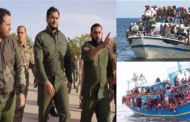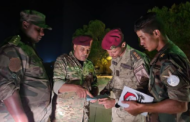SOHR says some 150 Syrian mercenaries preparing to be deployed to Libya, as Syria’s Afrin, Aleppo outskirts becoming mercenaries “reservoir”.
Jul. 8, gunmen attack LNA 128th Brigade forces north of Al-Jufra’s Sokna area, fly scene after facing counterattack.
Jul. 6, Libya’s House of Representatives fails again to approve 2021 general budget draft over dissent between lawmakers, GNU leadership.
NATIONAL SECURITY AND IMMIGRATION
- SOHR director Rami Abdel Rahman, said that about 150 Syrian mercenaries are preparing to move through Turkey to the areas of influence of the Turkish-backed factions in Libya. Abdul Rahman added that Afrin and the countryside of Aleppo in Syria have become a “human reservoir” for Syrian mercenaries;
- Jul. 8, GECOL announced the success of the operational tests for the first gas unit at the Ubari power station, southwest of the country. The unit will add 165 MW to the Libyan grid. The work on the Ubari plant project has been suspended since 2017, due to the withdrawal of the foreign company undertaking the project. The Ubari Gas Power Plant will be connected to the electrical grid after completing the Ubari-Fajeej power transmission line, according to the project’s management team;
- Jul. 8, LNA General Command announced in a statement that gunmen had attacked its forces north of the Sokna area in Al-Jufra. The attack against the 128th Brigade occurred on the night of 8 July, and the “terrorist gang fled the scene after being faced with an appropriate response by the brigade,” the statement read;

- Jul. 7, Libyan Parliament Speaker Ageela Saleh said that the memorandum between the Sarraj’s GNA and Turkey is null and void. Saleh stressed the need for Turkish and other foreign troops to withdraw from Libya. He called for Greek entrepreneurs to invest in the country, noting that the new government will adhere to all its obligations to foreign investors;
- Italian Prosecutors have launched an investigation against the Libyan coastguard after footage emerged showing coastguard firing on a migrant boat in the Mediterranean Sea. Rescue workers from the German organisation Sea-Watch recorded the Libyan coastguard patrol vessel coming dangerously close to the small wooden boat and apparently firing shots in an attempt to force the 64 people onboard back to Libya.

NATIONAL POLITICS
- US-based law firm Brownstein Hyatt Farber Schreck has registered to represent former Libyan Interior Minister Bashagha in the United States on financial industry anti-corruption activities, and the promotion of elections. The law firm reported its work for Bashagha under the Federal Foreign Agents Registration Act (FARA), which requires the disclosure of certain matters for foreign clients beyond traditional court-based litigation;

- The Social Council of Libya’s Warfalla Tribe stressed the need to renounce division, and extinguish the fires of sedition in the country. It claimed that the crisis in Libya can only be resolved by the Libyans themselves, and that foreign interventions harm the interests of the Libyan people. In a statement, the council expressed its reservations about the mechanism for selecting members of the Libyan Political Dialogue Forum (LPDF), and confirmed its support for holding the elections on 24 December. It also stressed the importance of adhering to the unity of Libya, describing it as a red line;
- Jul. 6, the Libyan Parliament failed to approve the state general budget submitted by the Government of the National Unity (GNU) for the fifth time, according to the Parliament’s official spokesman AbdAllah Belhaq. The session was spent in close discussions between the parliament’s Planning and Finance Committee, and the Ministerial Committee formed by Prime Minister Abdel-Hamid Dbaiba to amend the draft budget law.;
INTERNATIONAL RELATIONS
- Mohamed Abdelali Misbah, Chargé d’Affairs at the Libyan Embassy in Cairo met Mohamed Abu Bakr, Egyptian Assistant Minister of Foreign Affairs, at the headquarters of the Egyptian Ministry of Foreign Affairs. Abu Bakr welcomed the Ambassador, and expressed the full support of Egypt’s leadership and people for the comprehensive political settlement of the Libyan crisis. He confirmed the readiness of the Egyptian Ministry of Foreign Affairs for unlimited cooperation with the Libyan Ministry of Foreign Affairs, pursuant to the directives of President Abdel Fattah El-Sisi;
- Jul. 10, Libyan PM Dbaiba held a telephone conversation with his Tunisian counterpart Hichem Mechichi on the latest updates regarding the epidemiological situation in both countries, confirming that the decision to close the land and air borders between the two countries was a preventive and temporary step that aims to save the lives of millions of citizens in light of the rapid rise in COVID-19 cases;
- The Military Commission of the General Command of the Libyan National Army (LNA), held a meeting with the UN Envoy to Libya, Ján Kubiš, in the city of Benghazi, said Director of the LNA’s Moral Guidance Department, Major General Khaled Mahjoub. In press statements, Al-Mahjoub added that the meeting, which was held Jul. 10, discussed the Geneva decisions and ways to implement them. “The meeting also focused on evacuating foreign forces, expediting the expulsion of mercenaries, and completing securing the main coastal road to open it,” he noted;
- Jul. 10, the leaders of the Group of Five of Sahel countries (G5 Sahel) called on the United Nations (UN) and Libya to communicate with them the details of the plan to remove 30,000 foreign forces and mercenaries from Libya. The Heads of State of the G5 Sahel welcomed the UN Security Council Resolution on April 16th, which called on all parties to the conflict in Libya to ensure the full implementation of the ceasefire. The resolution also urged all member states to respect and support this process, by withdrawing without delay all foreign forces and mercenaries from the North-African country;
- Jul. 10, the Chamber of Commerce, Industry and Agriculture in Derna received a Greek delegation specialized in ship maintenance and port investment, at its headquarters in the Shahat Company. The visit aimed to discuss a number of projects, including operating the sea port of Derna, as well as investment opportunities in the region. The aim is to revitalize the economy in addition to finding job opportunities;
- The Russian Deputy Foreign Minister, Sergey Vershinin, announced that Moscow is ready to discuss and coordinate steps on the Libyan file with Washington and other concerned parties. In press statements, Vershinin said that, “we are open to dialogue on Libya with all interested parties, including, of course, the United States (US).” He added that, “in this regard, I would like to note that back in December 2019, during negotiations with US Secretary of State, Mike Pompeo, Minister of Foreign Affairs of the Russian Federation, Sergey Lavrov, voiced a proposal to launch a mechanism for Russian-American consultations on the entire spectrum of issues of promoting an inclusive inter-Libyan political settlement.” “Unfortunately, we have not received a response to this initiative”;

- Jul. 10, the United Nations (UN) Special Envoy to Libya, Ján Kubiš, revealed that he is set to discuss the situation in Libya, especially with regard to the planned elections and the implementation of the ceasefire agreement, with members of the United Nations Security Council (UNSC) in New York on July 15. In press statements, Kubiš said that the UNSC will hold a ministerial meeting chaired by France. He added that this is yet another opportunity to mobilize the support of the international community to study these paramount goals which the Libyan people have set for themselves, in order to implement and achieve them all;
- Italian media announced the imminent arrival of a C-130 plane to Libya, carrying a civil protection and firefighting team to provide technical assistance and help local authorities in extinguishing the devastating fires sweeping the country. According to a statement issued by the Italian authorities, the team, consisting of five officials, three from the Civil Defense and two from the National Fire Corps, left Rome-Ciampino airport for Libya. This came as part of a mission in coordination with the Libyan Ministry of Foreign Affairs, and is aimed at exchanging good practices in firefighting with local authorities;
- Jul. 8, the Kingdom of Bahrain published the national terrorism lists in its official gazette, in order to combat money laundering and terrorist financing. The list included individuals, organizations and media groups, including seven Libyan leaders and entities: Ali Al-Sallabi, Ismail Al-Sallabi, Abdel-Hakim Belhaj, Sadiq Al-Gharyani, Mahdi Al-Harati, Ahmed Abdel-Jaleel Al-Hasnawi, and Al-Saadi Abdullah Ibrahim Bukhazem. This is in addition to terrorist groups such as the Ansar Al-Sharia, and the Libyan Islamic Fighting Group (LIFG), the Benghazi Revolutionaries Shura Council (BRSC), the Benghazi Defense Brigades (BDB), and a number of media arms of the terrorist groups such as Al-Nabaa, and Al-Tanasuh TV channels;
- Jul. 8, UNSMIL head Ján Kubiš formally submitted the final reports of the International Financial Audit Review to the Presidential Council, and the heads of the two branches of the Central Bank of Libya (CBL), Governor Al-Siddik Al-Kabeer, and Deputy Governor, Ali Al-Hibri. This comes after a three-year process that was initiated by the former Prime Minister, Fayez Al-Sarraj, who requested support from the UN to conduct the review.
- Jul. 7, Italian Defense Minister, Lorenzo Guerini said that with regard to defence policy in Libya, the presence of mercenaries and foreign militants was “a matter of concern.” In a parliamentary briefing on Italy’s participation in international military missions, before the joint foreign and defence committees in the House and Senate Jul. 7, Guerini stated: “After the desired goal of the elections is reached, it will be necessary to move forward with the reform of the security sector, in this country”;
- The global NGO, Oxfam has asked the Italian government to stop funding Libya’s Coast Guard, stressing the need for a change of approach with the direct management of migration flows. Oxfam said Italian funding for the coast guards is increasing despite the fact that people “are continuing to die along the central Mediterranean route, and the modalities of intervention of the so-called Libyan coast guards are at this point well known.” The Italian Cabinet has decided to allocate an additional EUR 500,000 in 2021 to support the coast guards’ activities, for a total of EUR 32.6 million spent since 2017;
- Jul. 6, the Spokesman for the High Representative for European Security and Foreign Policy, Peter Stano, confirmed that the EU has not delivered three patrol boats to the Libyan Coast Guard, as part of the ongoing cooperation between both parties. He described the rumours circulated on this issue as “false news.” In a press statement, Stano indicated that the EU supported the renovation of three ships, which were handed over to the General Administration of the Coast Security, which is a different entity from the Libyan Coast Guard, according to the Aki news agency;
- The British Ambassador to Libya, Nicholas Hopton, stressed the need to hold Libya’s elections on their set date. He also called for implementing the agreements of the Berlin Conference, which requires the departure of foreign forces from Libya without delay. In press statements, Hopton called on international actors to assume their responsibilities and support the Libyan people by withdrawing their forces, fighters, and mercenaries, for the stability and security of the country;
- Jul. 5, IRINI chief, R. Adm. (OF-7) Fabio Agostini said they are ready to resume training of the Libyan Coast Guard and Navy, despite the obstacles caused by “political influences in Libya by countries outside the European Union.” Agostini refused to comment on a question by the Italian news agency Nova, about a video published by the NGO “Sea Watch” that showed the Libyan Coast Guard shooting at migrant boats in a Maltese search and rescue area;

- Jul. 5, Italian President Mattarella called on Rome and Paris to raise the level of bilateral cooperation, in order to establish stability in Libya and the Sahel region. In press statements, following a meeting at the Elysée Palace with his French counterpart Emmanuel Macron, Mattarella said that Europe can convey its message of peace and cooperation to neighbouring regions, such as Libya and the Sahel;
- Jul. 5, the Libyan Deputy Foreign Minister, Mohamed Said Zeidan, met with the Tunisian Ambassador to Libya, Al-Asaad Al-Ajili in Tripoli. According to the Foreign Ministry’s media office, they discussed a number of issues of common concern, including the importance of coordinating positions in regional and international forums. They also discussed the affairs of the displaced and expatriates in the two countries, and ways to limit and dry up sources of illegal immigration;
- Jul. 5, the Arab League stressed the need for all Libyan parties to show a spirit of consensus in order to overcome the current obstacles, in preparation for holding the December elections on time. It called on all sides not to waste the available opportunity through which the Libyan people will be able to achieve stability, and to find a way to reach a settlement;
- Jul. 5, the UN Support Mission in Libya (UNSMIL) congratulated the High National Elections Commission (HNEC) on the launch of the voter registration system. It said this update represents a key milestone towards the realization of the Libyan people’s overwhelming demand for national elections on 24 December 2021. In her remarks during the launching event, UN Assistant Secretary-General, Resident and Humanitarian Coordinator for Libya, Georgette Gagnon, said “as we all know, Libya is at a critical crossroads. After many years of conflict and division, after more than seven years without national elections, there is a new opportunity to move forward and for Libyans to exercise one of their most basic rights, the right to democratically elect their representatives and fully restore legitimacy to their institutions”;
- The Turkish Foreign Ministry said that Libya is not the primary source of irregular migration, expressing its regret over the recent tragedy that occurred in the Mediterranean, which claimed the lives of at least 43 people. Ankara explained that lack of coordination of search and rescue responsibility at sea within the EU, and endeavours to shift international obligations to transit countries, “is posing a threat to the right to life of migrants”;
- An ex-lieutenant police officer from Libya has claimed that the Libyan Coast Guard is actively working with smugglers to let the migrants pass to Europe, according to EU Observer news. “The Libyan Coast Guard and smugglers are one together. They are not under the law, they are above the law,” he told EU Observer news Jul. 9. “The smugglers pay money to the Libyan Coast Guard to let them pass [to Europe by sea],” he added. The officer added that the coast guard robs intercepted migrants and refugees of all their possessions, before handing them over to the authorities. “Those that can be squeezed for more cash are returned to detention centers, while the more impoverished are sent to state-run prisons,” he said.



























